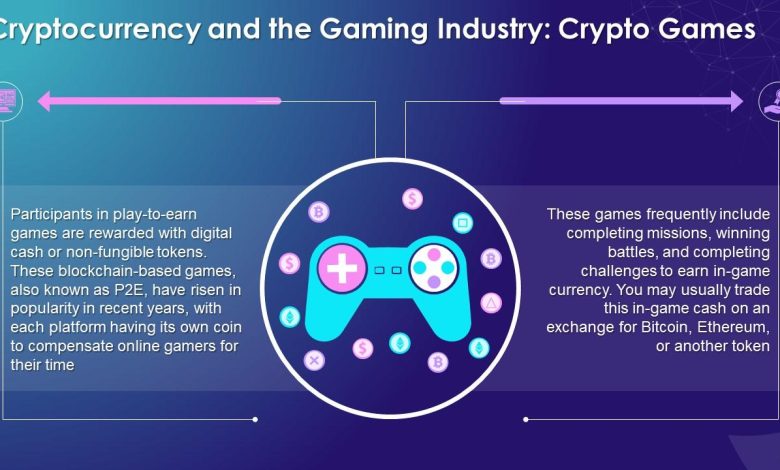How Blockchain Is Transforming the Gaming Industry

- Introduction to Blockchain Technology
- The Rise of Blockchain in Gaming
- Benefits of Using Blockchain in Gaming
- Tokenization and In-Game Assets
- Enhancing Security and Transparency in Gaming
- Future Implications of Blockchain in the Gaming Industry
Introduction to Blockchain Technology
Blockchain technology is revolutionizing the gaming industry by providing a secure and transparent way to track digital transactions. This innovative technology allows for the creation of decentralized networks where data is stored in a secure and immutable manner. By utilizing blockchain, gaming companies can offer players a more secure and fair gaming experience.
One of the key benefits of blockchain technology in gaming is the ability to verify the ownership of in-game assets. This means that players can truly own their virtual items and transfer them between games or even sell them for real money. Additionally, blockchain technology enables the use of smart contracts, which are self-executing contracts with the terms of the agreement directly written into code. This ensures that transactions are automatically processed without the need for intermediaries.
Another advantage of blockchain technology in gaming is the prevention of fraud and cheating. Since all transactions are recorded on a public ledger that is accessible to all participants, it becomes nearly impossible to alter or manipulate the data. This increased level of transparency helps to build trust among players and developers alike.
Overall, blockchain technology is transforming the gaming industry by providing a more secure, transparent, and efficient way to manage in-game assets and transactions. As more gaming companies adopt this technology, players can expect to see a more fair and rewarding gaming experience.
The Rise of Blockchain in Gaming
Blockchain technology has been making significant strides in the gaming industry, revolutionizing the way games are developed, played, and monetized. The rise of blockchain in gaming has opened up a world of possibilities for gamers and developers alike.
One of the key benefits of blockchain in gaming is the ability to create unique digital assets that can be owned and traded by players. These assets, known as non-fungible tokens (NFTs), are stored on the blockchain, ensuring their authenticity and scarcity. This has led to the emergence of a thriving market for in-game items, skins, and collectibles, allowing players to truly own their virtual possessions.
Moreover, blockchain technology enables transparent and secure transactions within games, eliminating the need for intermediaries and reducing the risk of fraud. Smart contracts, self-executing contracts with the terms of the agreement directly written into code, ensure that transactions are carried out automatically and without the need for third-party intervention.
Another exciting development in the gaming industry is the concept of decentralized autonomous organizations (DAOs), which are community-run organizations governed by smart contracts. DAOs allow players to have a say in the development and direction of the games they love, fostering a more collaborative and inclusive gaming ecosystem.
Overall, the rise of blockchain in gaming is transforming the industry by empowering players, enabling new revenue streams for developers, and fostering a more secure and transparent gaming environment. As blockchain technology continues to evolve, we can expect to see even more innovative applications that will shape the future of gaming for years to come.
Benefits of Using Blockchain in Gaming
There are numerous benefits to utilizing blockchain technology in the gaming industry. This innovative technology offers increased security, transparency, and decentralization, which can greatly enhance the gaming experience for players. Some of the key advantages of using blockchain in gaming include:
- Enhanced Security: Blockchain technology provides a secure and tamper-proof system for storing data, making it nearly impossible for hackers to manipulate game outcomes or steal sensitive information.
- Transparency: By utilizing blockchain, gaming companies can offer players full transparency into the game’s algorithms and mechanics, ensuring a fair and trustworthy gaming environment.
- Decentralization: Blockchain allows for decentralized ownership of in-game assets, giving players true ownership and control over their virtual items.
- Reduced Transaction Costs: With blockchain, players can make secure and low-cost transactions without the need for intermediaries, such as banks or payment processors.
- Improved Data Privacy: Blockchain technology enables players to have greater control over their personal data, reducing the risk of data breaches and unauthorized access.
Overall, the integration of blockchain in gaming has the potential to revolutionize the industry by providing a more secure, transparent, and player-centric gaming experience. As more gaming companies adopt this technology, players can expect to see a shift towards a more fair and decentralized gaming ecosystem.
Tokenization and In-Game Assets
Tokenization and in-game assets are revolutionizing the gaming industry by introducing a new way for players to truly own their digital items. Through the use of blockchain technology, game developers can create unique tokens for in-game assets, allowing players to buy, sell, and trade them securely on the blockchain.
By tokenizing in-game assets, players have the ability to prove ownership and authenticity of their items, which was previously impossible in traditional gaming. This opens up a whole new world of possibilities for gamers, as they can now truly own their virtual items and even transfer them between different games that support the same tokens.
Furthermore, tokenization also enables players to earn real money by selling their in-game assets to other players or collectors. This has created a new economy within the gaming industry, where players can monetize their skills and time spent in-game by trading valuable tokens.
Enhancing Security and Transparency in Gaming
Blockchain technology is revolutionizing the gaming industry by enhancing security and transparency in gaming transactions. By utilizing blockchain, game developers can create secure and tamper-proof systems that protect players’ data and assets. This increased security helps to prevent fraud and hacking, providing players with peace of mind while engaging in online gaming activities.
Furthermore, blockchain technology allows for greater transparency in gaming operations. Through the use of smart contracts, all transactions are recorded on a decentralized ledger that is accessible to all parties involved. This transparency ensures that all gaming activities are fair and free from manipulation, creating a level playing field for all players.
With blockchain technology, players can have confidence in the integrity of the games they are playing, knowing that the outcomes are determined by a secure and transparent system. This increased trust in gaming platforms can lead to greater player engagement and loyalty, ultimately benefiting both players and game developers alike.
Future Implications of Blockchain in the Gaming Industry
Looking ahead, the integration of blockchain technology in the gaming industry is poised to have significant future implications. This innovative technology has the potential to revolutionize the way games are developed, distributed, and played. By leveraging blockchain, game developers can create decentralized gaming platforms that offer increased security, transparency, and ownership of in-game assets.
One of the key benefits of blockchain in gaming is the ability to enable true ownership of digital assets. Players can securely buy, sell, and trade in-game items without the risk of fraud or theft. This opens up new opportunities for players to monetize their gaming experience and create a thriving in-game economy.
Furthermore, blockchain technology can enhance the overall gaming experience by enabling cross-platform compatibility and interoperability. Players can use their in-game assets across different games and platforms, creating a seamless gaming experience. This can lead to increased player engagement and retention, as well as new opportunities for collaboration and competition.
As blockchain continues to gain traction in the gaming industry, we can expect to see more innovative use cases emerge. From decentralized autonomous organizations (DAOs) governing in-game decisions to blockchain-based voting systems for player-driven content creation, the possibilities are endless. The future of gaming is bright with blockchain technology at its core.



